Editor's note: the following chapter contains the 'n' word which is offensive in modern times. I have not removed it from this transcription as I consider it to be a pure reflection of the language of the early 1900s and I do not want to sanitise a historical text. There is nothing in the rest of the diary to suggest that Percy was overtly racist. If it bothers you, please skip straight to Chapter 3
Egypt and Gallipoli
JULY 1915
Thurs. 15. Up at daylight. Very sick all morning. Had no breakfast or dinner, but in the afternoon the sea became calmer, and I got well enough to enjoy a good meal at teatime. During the afternoon the ship was suddenly stopped and two boats lowered. It turned out that someone had fallen overboard. He must have sunk at once, as no more was seen of him; he was of the 7th of the 1st. Made my bed on a spare table tonight in preference to the hammock, but I think if any the latter is the better.
Fri. 16. After an uncomfortable night, woke about 5.30am. The engines were stopped and, thinking we must be in Port Philip, I got up and went upstairs. We had stopped outside the heads and were waiting for daylight before going in. Our company were on guard today and it was my luck to be one of them. The shifts were 4 hrs. on and 8 off, and being 3rd. shift, I didn't have to go on till 5pm.
We entered Port Philip about breakfast time, and swung slowly across the harbour, arriving at a pier at Port Melbourne some time later. Another big troopship, the Demosthenes, was on the other side of the pier, and later on a large number of troops marched down the pier with flags in their muzzles, and bunches of wattle in their hats. It took them about three hours to embark. They cheered us vigorously, but our chaps were not allowed to give them a cheer in reply. Sent postcards to Mum, Mr. Harward, Beattie Bostock, & Mrs. Tanner. During the day the Governor-general came and inspected us, and wished us a safe return, etc. Our boys were inclined to be obstreperous, and the guard was kept pretty busy off and on all day. At last the other ship was ready to move off. A cheer rose from her decks, and her soldiers turned towards the shore. Some civilians appeared on the far end of the long pier, running towards us. At the same time the great ship began to move slowly out. She moved slowly, but it was a long pier, and before the crowd of anxious friends and relatives had time to reach the end of the pier, the ship was well under way, and they were disappointed. I was angry and indignant, we all were, at such uncalled for cruelty on the part of the authorities. After keeping the people waiting for about three solid hours outside, and then to let them in -- too late. It was an arrow in the hearts of many a loving mother and sister and wife. Our brave boys go to the war, and our brave mothers make great sacrifices, and our stony hearted authorities treat them all like dogs. It is a shame.
Towards evening our boys became more and more unmanageable, and planned to break out if no leave were granted. A.T. they gathered about and a few broke out on to the wharf. Later on they rushed the gangway, and about thirty or forty got out. Then Lieutenant Wilson rushed to the gangway to stop them. From what I heard afterwards, Wilson struck a man trying to get out. He was sharply reprimanded for it by a superior officer, and was boohed many times by the crowd. I felt sorry for him. He seemed rather downhearted about it afterwards. There was general hubbub for the greater part of the evening, and some more men escaped by climbing down ropes over the ship's side.
A number of R.A.A. and others, including Tasmanians, embarked with us today.
Early in the morning the guard was turned out to arrest Cherry, who came back drunk and used vile and insulting language to a nurse. The guard hesitated about arresting him. I went towards him, but didn't feel up to tackling him alone. Bob Avant was going to fight him for his insults, but he wouldn't fight. An officer then came along and persuaded Cherry to go to bed, and the guard turned in again. We may be crimed tomorrow over it (or today rather).
Sat. 17. On guard again from 5am. till after 9 am. About midday the engines started going, and I went on deck to see the last of Melbourne. A big ship was approaching, and it turned out to be the troopship "Yarra" returning with a load of wounded soldiers from the front. They crowded her decks to see us off, and cheer after cheer rang out from both vessels as we passed each other opposite the end of the wharf, she coming in and we going out.
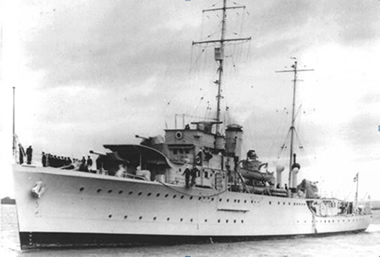
HMAS Yarra
When we got outside the heads we dropped the pilot and then headed for the west.
Sun. 18. Woke up to find the sea very rough. Sick all day.
Mon. 19. Sea still rough. Sick all day.
Tues. 20. Ditto.
Wed. 21. Sea slightly calmer. Still sick and miserable.
Thurs. 22. In sight of land today. Approached Freemantle in the afternoon and anchored in the middle of the stream, probably so that the boys wouldn't be able to break out. I still felt very sick even after the ship was stopped, but gradually improved and was O.K. about an hour afterwards. A lot of small boats were alongside, and the boys threw ropes over the side and got rowed ashore. Had a good tea, the first decent one for days, and then decided to go ashore with the crowd. Climbed down one of the ropes into a small boat, and, with a couple of others, was rowed ashore. Allthorpe and I strolled up through the town, and, picking up with some more of the boys, we decided to go down to Perth.
Caught the 6.30pm. train, arriving at Perth about 7.15pm. We took up with Osborne and Carroll, and had a look round Perth, which seems to be a comparatively small place. Went into a picture show for a while. Caught the 9pm. train back to Fremantle, where we lost Osborne. The three of us went into a Dago's shop and had a good feed of poached eggs. There were other soldiers there, and one of them, who was drunk, was acting and talking in a disgusting manner. Up in the main street a lot of the boys were drunk, and carrying on in a manner likely to bring disgrace on N.S.Wales. Some said that Lieutenant Wilson was drunk, and was shouting for the boys. Perhaps he was trying to regain some of his lost favour.
While returning in the train, I had written a short letter to Mum, and this I now posted. Also sent a postcard to Ettie Cunynghame, and one to Lorrie Maloney. Lost the run of Carroll and Allthorpe, so decided to return to the ship. Went to the wharf and found a launch waiting. A lot of the boys were making back, as it was about 11pm., and some very nice girls were there to say goodbye to us. Some of them kissed us before we left in the launch. A policeman was on duty on the ship, taking the names of the men as they returned, but I suppose nothing will come of it. Brought with me some nice navel oranges for when I'm seasick.
Having sworn off sleeping in a hammock, I made my bed on the poop deck, and turned in there.
Fri. 23. Awoke about 4.30am. to find the ship getting ready to move off. As soon as the propeller started I got the queer feeling in the head again. Some chaps on the wharf were yelling to us to come for them. The great boat turned slowly round, and then began to move off, accompanied by the despairing cries of the men on shore, who cursed and swore at us for going without them. Slowly we slipped down the stream, and the despairing cries of the men on the wharf grew fainter in the distance, till they could be heard no more. They were left behind.
During the morning the roll was called to find out who were left behind. Campbell, of my mess, was one of the missing. They will probably be sentenced to 28 days in cells at the barracks without pay for that time, and will then have to wait for the next contingent from W. Australia, before they get away. It is said that some nurses were also left behind.
Sick again today, as bad as ever.
Sat. 24. Sick again today, but improved in the afternoon, and ate a fairly decent tea. Was told off for mess orderly for tomorrow.
Sun. 25. Felt O.K. this morning, but while waiting for the dry rations, took very ill suddenly, and had to give up the job of orderly. Got all right again later on. Church of England service in the morning. Dug up my studies again, and got to work on them. The weather is getting warm now, and the nights are no longer cold. It is too hot to sleep in our "dungeon", so we all doss on deck.
Mon. 26. Kit inspection this morning. Feeling O.K. today. Fire alarm sounded this afternoon, and we all had to turn out with lifebelts on at our boat stations for practice.
Tues. 27. This mng. a bath parade was ordered and we had to turn out on deck and have a bath under one of the big hoses. It was quite enjoyable. It is to be a regular thing, and one lot have their turn every second day.
Wed. 28. ----------------------
Thurs. 29. Wrote to Mum. Must get through my correspondence before we get to Aden.
Fri. 30. On guard today, on first relief, on duty at passage amidships. On from 9am to 1pm. A.D., drew a conte drawing of a foreshortened view of side of the ship cleaving through the water, as I had seen it by looking over the railing while on guard this morning. Tried to make a speciality of the wave effect, but it didn't come up to expectations.
This is Australia Day, and there have been various sports on all day. Arrangements had been made for a grand concert tonight, using the well deck for a stage. As soon as tea was over, the boys began to look for the good positions for the concert. I climbed up to the roof over the poop deck, but as it seemed likely to rain, came down again. Studied "Inf. Training" for some time. Came out abt. 10 to eight. The poop and promenade decks and their roofs were crowded, as well as the main deck. The boys were impatient, singing songs while waiting. Then they got on to farmyard cries, and there were some splendid imitations of roosters crowing, chickens, young turkeys, magpies, lambs, etc.
It was after eight when the concert started, with a band selection. Then there was the eternal "Veteran's Song", and comic recitations. I was waiting to see Serjeant Woods on his fancy jumping. He started just before I had to go on duty at 9pm., but I had the pleasure of seeing a couple of good acts, jumping a man in a chair and taking a cigarette out of his mouth, with his feet as he went over, and jumping over the piano. Then I had to get. On duty till 1am.
Sat. 31. Sports continued today. Boxing all morning. At last an M.T.
AUGUST 1915
Sunday, 1st. Church of England service on well deck this mng. Studied Topography all day.
Monday, 2. Mess orderly today. Wrote (A.T., not too well.) about a dozen letters.
Tuesday, 3. Sea rough. Very seasick again, all day.
Wed. 4. Sick all day. Letters posted.
Thurs. 5. Sea somewhat calmer. Not so seasick. Studied a bit.
Fri. 6. Sea much calmer. Pretty well O.K. again. Studied signalling and Topography. A.D. studied Musketry, lying on main deck. At about 4.30 pm. got up and got first sight of Arabia. It was an imposing sight, rugged and precipitous mountains rising up from the water's edge to a considerable height. They were devoid of vegetation. It was quite a pleasure to be able to look on land again, after not seeing any for two weeks. We passed to the left of the headland, and to the right of other land, which I presumed to be part of Africa. A few buildings came into view beyond the headland, and a small ship came out to meet us.
Later on a port appeared. There was a big three-funnelled armed merchantman, a few smaller vessels, and a number of small sailing boats, making quite a pretty scene against the dark ominous looking background. A boat put out from the small ship that came to meet us; it was occupied by a white man (pilot) and 4 blacks. It was quite amusing to watch the nigs rowing. When we got to the port, a lot of boats came alongside. They were occupied by niggers, who came to sell tobacco, cigarettes, tinned fruit, etc. They invariably demanded an exorbitant price at first, but would readily come down if they could get no sale. They would often ask 4/- or 5/- for an article, and eventually sell it for 1/-. They would throw a line up to the purchaser, who would haul up a basket, put the money therein, and then lower it, whereupon the article to be purchased would be placed in the basket by one of the nigs and hauled up by the purchaser.
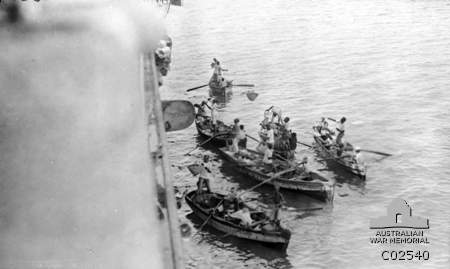
Local men trading with troops on board an Australian transport at the port of Aden, Egypt.
Baskets transferring food and goods are being lifted up to the ship by a set of ropes. AWM
The nigs were awfully amusing, and I enjoyed a good laugh at them. They were such comical beggars, with their black faces and short curly hair, white teeth, and skinny limbs. They were dressed in dirty loincloths, and a few wore turbans. One or two were completely bald. It was dead tricky to see their black heads bobbing about just over the water, and when they smiled - such a display of shining white teeth in their black setting, it would tickle the fancy of a born grouch.
I had seen Aden described as "dry dreary desolate Aden", but I thought it one of the most interesting and picturesque places I had ever seen. I was so taken up with it that I didn't go down to tea till it was over, and there was none left. Managed to score a little butter from the next mess, however.
Got my pencils and paper and went up on "top" to sketch a portion of Aden with the mountains in the background. (It is reported that fighting is in progress 15 miles from Aden. A camel train and a body of troops were seen on the shore by a
lot of our chaps) Only managed to get the main outline drawn in when it was too dark to go on with it. I was sorry too, as we'll probably leave before daylight tomorrow. It was lovely and cool on "top", which is two floors above the main deck, and five floors above our "dungeon". It was very refreshing too, to be able to look out and see all the town lights across the water, after the changeless monotony of the last two weeks.
The yelling and shouting of the trading niggers continued till long after "lights out", and were still going strong when I lay down on my blankets and went off to sleep. (The pilot brought news that Warsaw has fallen, and that the English are being hard pressed near Calais. If so, my prediction of a few days back came true.) Left Aden at about 4am.
Sat. 7. Guard duty for the company today, but, being mess orderly, I escaped it. Studied Musketry during the morning. We passed a few islands in the Red Sea, also a few ships, which greatly relieved the monotony.
A.T. had a 4 rounds box with Blanch, went up on "top" and made my bed, which consisted of my overcoat for a pillow, on the canvas awning overhead. It was nice and fresh up there at first, but later on the breeze died away, leaving it hot and close.
Sun. 8. Church of England service this morning on well deck. The last service we'll have on the ship. Afterwards, practised signalling with George Schroder for awhile. A.D. got on to studying Field Service Regulations. A.T. lay down on the main deck with my rolled up bed for a pillow. Dropped off to sleep. Woke up about 1a.m. and unrolled the bed. Didn't bother getting undressed. Hot close night.
Mon. 9. A.B. studied F.S.Regs. Had inspection in full marching order. The black kit bags were resurrected, and we were told to put everything in them that we didn't immediately require. Packed mine as full as it would go. It is reported that we disembark at Suez, and proceed from there to Alexandria by land. If so, the disembarkation will probably be on Wednesday. A.T. boxed 3 rounds with Blanch.
Tues. 10. We got into the gulf of Suez early in the afternoon. Land visible on both sides. Rough mountainous country. Saw Mount Sinai in the distance over to the right. It was somewhere about here that the Israelites crossed the Red Sea, when the water was divided.
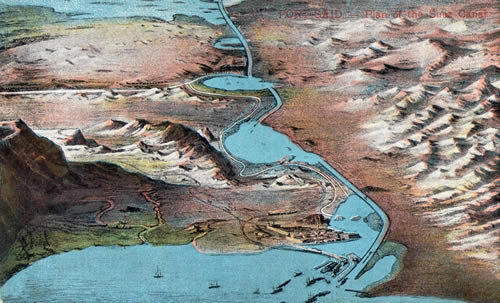
A.T. boxed 3 rounds with Blanch. We made it pretty willing. Met young Randall. "Fish" Randall's son. He was with Bill Jackson. He is in the R.A.A., and got on the boat at Melbourne.
The prizes for the sports which have been going on since "Australia" Day were given out tonight, and the band gave us a few tunes. This may be our last night on board.
Wed. 11. At about 5 a.m. someone got up and sighted Suez. In a few minutes everybody was up and hammocks rolled up. There was no need for reveille this morning. Before long we were anchored near the other ships anchored there. Later on a few sailing boats came up, and some newspapers came on board. I got one dated 9th. instant. It has turned out to be true about Warsaw falling into the hands of the Germans. There were no news of Gallipoli. A rumour has come aboard that the British have sunk two Turkish warships and thirteen submarines.
A few Arabs came alongside to sell cigarettes, tobacco, trinkets, etc. They were very different to the niggers at Aden, being a very light colour and wearing long gowns and white linen hats. Some wore fezzes. They came in sailing boats. After a few hours trading the Port Police ordered them away. The police were a couple of black men getting about in a sailing boat. They were dressed in white coat, trousers, and hat.
Suez is a rather queer looking place. It is composed of square buildings, mostly white or drab, and the town ends quite abruptly - no out-lying houses. At the left of the town there were a number of trees - the first we have seen since leaving Fremantle. A couple of warships were stationed at the mouth of the canal. Boats getting along through the canal appeared to be just moving through the sand.
A.D. we had a parade at 2pm. and were told that we are disembarking at 8a.m. tomorrow. We were then issued with 2 tins of tobacco and 2 packets of cigarettes each. Sold mine to Charet for 9d.
Thurs. 12. Up early, had a bath and got things ready for disembarkation. While we were having breakfast the ship was taken to a wharf inside the canal. We fell in with all our belongings at 8a.m. A couple of Arabs were diving for money in the water down below. They managed to get nearly every coin that was thrown in. On the wharf were a lot of ragged and disreputable looking men, women and children, and a few Port Police. The children would hold out their hands for money, and each time a coin was thrown, there would be a general scramble. Then the police would come along and chase them away, hitting them with their canes. It was a very amusing scene.
Later on we marched off with all our belongings to a building some distance away, where we had to remove all our clothes and don a white gown like the natives wear. Our clothes were then taken to be disinfected, during which process they were subjected to a great heat, which resulted in all leather articles being shrivelled up and cracked to pieces. Left my braces with the trousers and of course they were not much good when they came out. Had to tie them round my waist as a belt. Other chaps had leather-bound testaments and pocket-books destroyed. Fortunately I thought to remove my testament and notebook. The glue was melted from the cover of my "Musketry Regs." leaving the cloth binding hanging loose. Some had had leather belts, pocket-wallets, etc. completely destroyed. After it was over, we went back to the ship for lunch, after which we made our final departure. We were issued with ship's biscuits and bully beef as we marched out. A train(!) was waiting for us near the wharf. The carriages were much better than N.S.W. sheep trucks, even if they weren't much cleaner looking. At last we got a start on, at something after 3p.m. and a cheer went up as we rumbled clumsily along. After travelling a few hundred yards, the train stopped for some time. Then we moved on a few more hundred yards and stopped again, this time for about half an hour. There was a bolt loose somewhere.
Meanwhile a crowd of children followed the train calling for "backsheesh", and holding out their little hands for the "backsheesh" to be tossed to them. One chubby little fellow, with a nice little face, although it was black, and dressed in ragged clothes, kept running up and down, holding out his dimpled hands and saying, "Backsheesh, backsheesh, you got one-pence-backsheesh?" Little 5-year-old girls, some of them arrayed in nice clean pink dresses and fancy headgear joined in the general clamour for pennies. Some of the bigger boys brought cigarettes and sweets to sell to the troops.
Soon a policeman came along to chase them away. As he got near, they scuttled off further along the line. However he followed them up, and caught one of the bigger boys selling cigarettes, and took him in charge. The boy sobbed and pleaded, and bit and scratched, but all to no avail. A lot of our chaps yelled out, "Let him go! you --", and eventually several of them got out of the train and went over and forced the policeman to let the boy go, who then ran as if his life depended on it, but I think his main concern was for the boxes of cigarettes he carried.
At last the train moved on again, and went through the town of Suez, which was a squalid dirty looking place, but no less interesting and picturesque. We travelled along through dreary wastes of sandy desert, past several camps of Indian soldiers, and tiny native villages consisting of date and maize plantations and low mud hovels. An irrigation canal followed the railway, and provided a narrow strip of green through the prevailing wastes of sandy desert.
Some distance over to the right was the Suez Canal, and we passed several ships coming through. About 5p.m. we made some sort of a meal on the biscuits and bully, neither of which were very palatable, but we had to eat something.
At about dusk we stopped at a native township, and hundreds of the inhabitants thronged around the train selling watermelons, grapes, apples, etc. I was just dying to get some, but had no money with me but a pound note, and a penny.
We passed a number of villages, and at about 9p.m. stopped at Zag-a-zig, where an Arab was selling three boiled eggs and a piece of bread for 6d. In desperation I went up and offered him my penny for one egg, and he handed me the full 6d worth, whether by mistake or not I don't know. The bread was made of rye or something, and wasn't very nice, the eggs were all right, but were only about half the size of an ordinary hen's egg. I don't think they could have been hen's eggs, unless, perhaps guinea fowl's.
We moved on again, and arrived at Heliopolis about 10.30pm. I had thought we might go to Alexandria, but we detrained here, and after the usual delay, marched to a camp on the outskirts of the town, arriving there about 11.30pm. No blankets were supplied, and we lay down on our overcoats outside the tents. The night was nice and cool, but just too cool to sleep out without one blanket at any rate, so we had to withdraw to the shelter of the tent. The ground was soft and sandy, which made it easy to sleep on, and being tired after our trip, we soon settled down to a much needed rest in the famous old land of Egypt.
Friday, 13. Up about 5a.m. Met some of the chaps who transferred to the 19th and 20th battalions, which are in camp here, but which are leaving on Sunday or Monday for the front. It is said they are going to relieve the 1st Brigade, which has been cut to pieces, and which are coming back to be reorganized. If they do, I ought to meet Bert and Vern before long.
Fell in for a short while in the morning and were then dismissed till 10a.m. We were not given any breakfast, as the rations issued yesterday were supposed to last for 24 hours.
Strolled up town with Robertson and Blanch, and had breakfast for 4 piastres (10d) each. We changed our money for Egyptian coinage.
We then went for a look over the town. It is a nice clean looking place, with fine large buildings, the architecture of which is superb. They are all nice and clean, not like the dirty looking buildings in Sydney. The little mud hut of the Arab is conspicuous by its absence, and the dwelling places are all large residential flats of several stories. There are a few garden patches in some of the streets, but the trees are all small and don't give much shade. If only there were a row of Moreton Bay fig trees along each side of the streets, it would be, indeed, an ideal place. Greek, Arab, and French shopkeepers had their wares in glass cases out on the footpath, and often called after us to come and buy. Children would chase us about in an endeavour to polish our boots. One little urchin especially gave us no rest, but every time we stopped, he would be down on his knees applying his brushes, till at last he prevailed over Dudley, and then the three of us had to submit to the operation, and then pay the little beggar a half piastre each out of our rapidly vanishing funds. Others pestered us with cigarettes and postcards, the prices for which were generally exorbitant.
We were supposed to be back by 10a.m., but as nobody else seemed to be going back, we decided to stay. Went up to the other end of the town, past a queer looking building which is supposed to be the R.C. church. Others said it was a mosque. Saw the Palace Hotel, which has been converted into a hospital for the wounded, and is filled with soldiers from the Dardanelles. It is a fine building, and is supposed to be the largest hotel in the world.
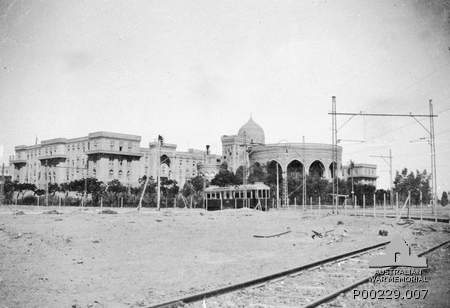 Heliopolis, Egypt, WW1. view of 1st Australian General Hospital at Heliopolis, near Cairo.
Heliopolis, Egypt, WW1. view of 1st Australian General Hospital at Heliopolis, near Cairo.
Located in the former Heliopolis Palace Hotel.
There don't seem to be many English people here at all, the population, apart from the natives, consisting mainly of French and Greek.
Shortly after 10a.m. we met some officers and a piquet, who were going around rounding up all the boys, and sending them back to camp. We went back and fell in, and were taken to a wooden shed for a lecture on musketry, after which went up town with Carrol, Jackson, and others and had dinner at a restaurant. Strolled up to the Soldiers' Club for a while. It was too hot to walk about much. Wrote three postcards, one to Mrs. Tanner, and one to Bill Leslie, and another to Elsie Sievright.
Back for parade at 5p.m. It was rather like hard work marching about in the sand. Drilled till 6.30p.m. No tea was supplied so we went up to the restaurant where we had dinner. Strolled up and down the town. Went in to a restaurant where they were showing pictures for the entertainment of their clients. It was after 10p.m. when we got back to camp, and we were warned that in future any one not in punctually at 10p.m. would be put in the guard tent.
During the day we met many soldiers who had returned from the Dardanelles, and heard various accounts of the fighting there. According to all accounts life is not altogether a picnic there.
Sat. 14. Up at 5a.m. Parade from 6 till 9. It was awful. It was a hot morning, and everybody seemed to be in a bad humour, and nobody had any heart for soldiering. After it was over, we had a breakfast of eggs and bread and jam. Lecture at 11a.m. in our mess shed. After dinner, which consisted of a meagre supply of stew, we were issued with pith helmets, linen shirts, and linen rifle covers. Went up town with Board, and went to the Soldiers' Club. Wrote to Mum. Also wrote to Bert and Vern, asking them their whereabouts. Had a light tea at the Club, and stayed there till about 9p.m. Bought a jar of jam coming home.
Sun. 15. Fell in at 7a.m. and marched about a mile away for Church parade. It was very hot, and a lot of us went to sleep during the sermon. Leave for the afternoon was granted to No. 3 platoon. Had dinner at 1p.m. It was better this time, and there was more of it. Got our leave passes, and dressed for a trip to Cairo. My main object was to go to the Cairo Soldiers' Club, and see the lists of the killed and wounded, in case Bert's or Vern's name might be therein. Went up town ahead of the others to buy a pair of khaki knickers to wear instead of the dungarees, which I had previously cut down. Had arranged to meet our lot at the tram terminus, but after waiting some time, they didn't turn up, so I went in without them. In the tram were some chaps in pyjamas who had escaped from hospital. One of them belonged to the 4th. battalion, and was wounded when they made the advance on yesterday week, when the First Brigade led the advance. He told me they were simply cut to pieces by shrapnel, the vast majority being killed outright. Only one officer in his battalion and two men in his platoon escaped. He said the brigade is coming back and is going to be reformed into a battalion. Our total casualties for the engagement, he said, were seventeen thousand, but the Turks lost many times more. What he said depressed me considerably, as, if there was such enormous loss, what might have happened to Bert and Vern? Still, I think he is probably exaggerating a good deal. He ventured the opinion that the Turks would be completely beaten in another week.
When we got to Cairo, a Queenslander showed me to the Soldiers' Club, but the latest list of casualties they had was dated July, 29th. They're expecting another tomorrow.
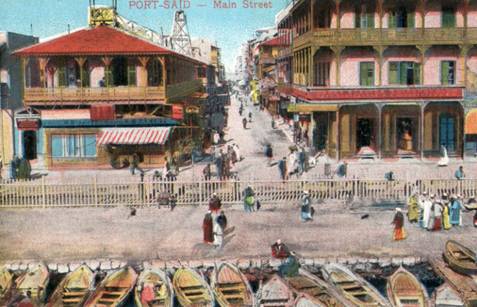
It will be a time of suspense till I can find out what's what. If the 1st. brigade is coming to Heliopolis, I ought to be able to find out something in a few days. It will be terrible if they are killed. Poor old Mum, whatever will she do? If they are only wounded, it won't be so bad. However, we can only trust in God. His way is best, and He knows what is best for us. Went for a stroll through the park, which is rather nice. Walked up along one of the streets, and bought a book on French at a bookshop. Had tea at a restaurant, and then went back to the park, and studied French till it was time to go home. Got back to camp about 9.30p.m.
The others had gone out to the Pyramids, with which they were very pleased. Coming back, some of them visited the "bad" part of the town, where they witnessed a "Can-can" dance, the vilest and most horrible thing anyone could imagine.
Mon. 16. Being duty company today, we had no drilling to do, and I put in most of the day studying French. 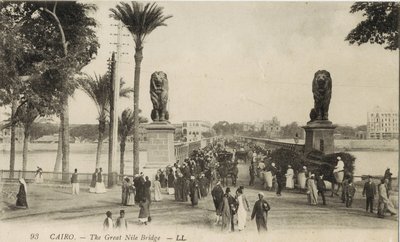 This evening I met a chap from the 3rd. battalion. He was wounded at the beginning of the big engagement on last Saturday week. Enquired of him about Bert and Vern, and he said there was a Smythe in the battalion, and that he was all right when he left, at the commencement of the big advance, but he didn't know how he had got on since.
This evening I met a chap from the 3rd. battalion. He was wounded at the beginning of the big engagement on last Saturday week. Enquired of him about Bert and Vern, and he said there was a Smythe in the battalion, and that he was all right when he left, at the commencement of the big advance, but he didn't know how he had got on since.
Came down town to the Soldiers' Club, and wrote a letter to Ettie Cunynghame, Oberon. Studied French.
Tues. 17. Tent orderly today. Little to do all day, so put in most of the time studying French. Heard this evening that a large batch of wounded from the Dardanelles are to arrive here at 10 am in the morning. Its quite likely that it may be the bulk of the 1st. Brigade's wounded.
Wed. 18. Asked Tyson for leave this afternoon to go to the Base Depot at Cairo to find out the whereabouts of Bert and Vernie. Also asked him about promotion to serjeant again, and he said he intended to put me into the first vacancy that occurs. Went into Cairo, and after a bit of hunting about, managed to find the Base Depot. Enquired at the Casualty Enquiry office, but the latest lists in were for the 30th. July, which, of course, did not include the Big Engagement. Bert's name was there, with a note that he was wounded in the right shoulder, and was at the Birmingham hospital. There was nothing about his having returned to the front, so perhaps he is still in England.
Didn't know what to do to fill in time for the rest of the afternoon. Only had 4½ piastres, so couldn't go out to the pyramids. Took a stroll round in the vicinity of the park. Went into a photo studio, but they wanted at least 10 piastres deposit on a dozen postcards. Strolled round into another street, which, from what was going on there, I know must be the famous "Wozzer". Young French girls, some of them pretty, dressed in short petticoats or nightgowns, were standing on little balconies all along the street, beckoning to the soldiers and trying to entice them into their dens of evil. In spite of all the warnings of the danger of diseases they had heard, a lot of the soldiers went into the vile houses.
Had a talk to several wounded soldiers from the Dardanelles during the afternoon. One of them was wounded in the Big Engagement, and according to his account, there were not so many killed as previous accounts indicated. He roughly estimated that out of the 1st. Brigade, there were about one thousand killed, and two thousand wounded, and about one thousand left. It appears that the assault was engineered so clumsily that the Turks knew all about it before they started, and got their machine guns and artillery into the best positions, so that when our boys sprang out of the trenches, they were cut to pieces. Besides this, many shells from our own ships fell among our own men. Judging from what the soldiers say, it would appear that our officers don't know their work too well.
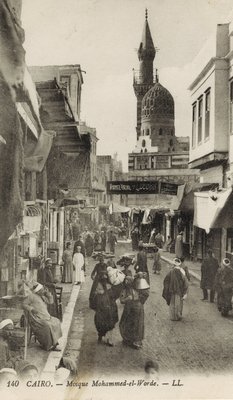 Had tea at the "Soldiers Meeting" Restaurant for 4 piastres. Had given the odd ½pt. to a beggar woman, so was stony broke. After tea, saw some of the real horror of the lower life in Cairo. Without doubt it is the vilest place imaginable.
Had tea at the "Soldiers Meeting" Restaurant for 4 piastres. Had given the odd ½pt. to a beggar woman, so was stony broke. After tea, saw some of the real horror of the lower life in Cairo. Without doubt it is the vilest place imaginable.
Not having any money to pay my fare back to Cairo, I sold my penknife for 2 piastres, and then went back to camp.
Thurs. 19. The 7th. of the 1st. & 2nd. were paid today, but we were not. A lot of our chaps grumbled and growled, and tried to get the others to muck up during the evening parade. After tea, went to the Soldiers' Club and wrote a letter to Mum. Started one to Viv also.
Bill Jackson told me today that his officer told them that the whole of the 1st. Division were returning to Heliopolis in a few days. An advance guard has gone from the 7th. of the 1st. to meet them at Alexandria.
Fri. 20. This morning I found out for certain that Woods, Thornthwaite, and Howard are leaving our company, having transferred to the Signalling school. Was glad to think that at last I would get back my position of serjeant.
This afternoon the company was lined up and we were told that 108 men and three non-coms were wanted to leave for the front on Sunday. The non-coms were chosen by vote of the company, and Howie got in as serjeant, with O'Connor and Lax as corporals. Young Harwood was the only one who volunteered to stay behind. Corporals Charet and Browne were very disappointed that they couldn't come.
I was a bit disappointed, as I would have been a serjeant had we stayed a few days longer. Everything seems to have been working together to keep me down in the ranks, but its no use complaining. Perhaps if I had gone as a serjeant to the front, I would be killed first go. Anyhow, I'm not sorry to get away from Egypt, with its superfluity of heat and Arabs.
At 5p.m. we went for a short route march, and acted as an advance guard.
Sat. 21. Had a bit of bayonet practice this morning. Were paid abt. 1p.m. I only got 10/-. George Carroll and I went in to Cairo and had dinner at the Soldiers' Meeting, and then we took a tram for the pyramids. It was a rather pretty ride out in the tram, across the muddy Nile, and various irrigation canals, through the cultivated lands with their crops of maize, potatoes, etc. A nice clean asphalt road ran alongside the tramway, and was lined with trees on either side, which met overhead, and formed a shady green archway.
After about an hour's run we arrived at the terminus. A walk of a few hundred yds. brought us to the foot of the pyramid of Cheops. Our guide took us to various ancient tombs, then to a ruined temple, built of huge boulders of granite and alabaster. It was very interesting. Then we had a look at the Sphinx, the nose and chin of which had been blown off by Napoleon's artillery. The Sphinx was not as big as I had expected.
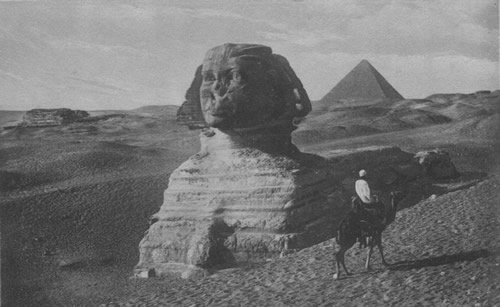
All the afternoon, Arabs and Egyptians of various shades and ages were worrying us trying to sell drinks, tobacco, etc., or wanting to take us everywhere and show us everything. They got on George's nerves, and eventually he got quite wild with them.
After leaving the sphinx, we came over to Cheops, and a guide took us right into the heart of the great pyramid. We had to leave out boots and hats outside.
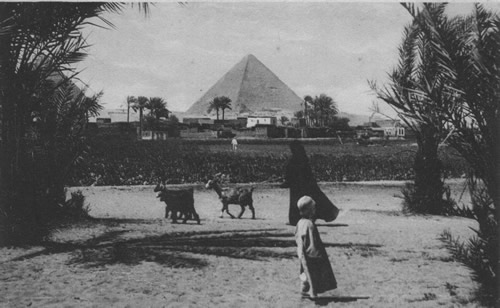
Entering through an opening in the side of the pyramid, we climbed along a rocky track into a long low narrow passage, sloping up at a steep angle. Niches were cut in the floor for a foothold, but they were worn smooth as glass by the constant tread of feet. After going a considerable distance, we at last arrived at the "King's Chamber", the walls and roof of which were of great solid blocks of granite, many of them weighing 19 tons, and having been brought a distance of 600 miles. The pyramid itself was built of native limestone, and the method of construction was to put down a layer of blocks, rolling each one into position, and then heap sand up all round, to enable the next layer of blocks to be rolled up one by one. More sand was heaped up as each layer of rocks went on, till at last the huge edifice was completed, buried in sand. They set to then and shifted all the sand away. The work was probably carried out by the Israelites in captivity under Ramses, the pharaoh who "knew not Joseph."
After leaving the King's Chamber, we went to the Queen's Chamber, which was much the same. The outer end of the passage leading into the pyramid was blocked up with tremendous blocks of granite, and its a mystery how they could have been placed there, as they could not be rolled up by the sand process. When the pyramid was opened up, an opening was cut through the limestone to the side of the granite, as the latter was too hard.
Came out of the pyramid and paid our guide up, and then climbed up to the top on our own. It was a long tiresome climb, and my legs ached some by the time we reached the top, which was flat, and about 5 yds. square. Every available square inch had somebody's name cut in it. Rested there for a while and had a look round. Everything looked nice and green towards Cairo, but in every other direction were bare wastes of sand. A short distance away was another large pyramid, the upper portion of the sides of which were smooth and flat, rendering it practically inaccessible. At the foot of Cheops, to the west, were the ruins of a buried city that was being excavated. Over to the South were a few tents, the remains of Mena camp, where Bert and Vernie spent their training days in Egypt. There were a few little pyramids round about Cheops, and several larger ones a considerable distance away to the west. (The guide said they were 9 miles) The sphinx looked a tiny insignificant thing from the top of Cheops. A couple of natives had a stand up there with tea, cakes, and lemon squash. Before leaving I picked up a small chip of limestone to take away as a souvenir.
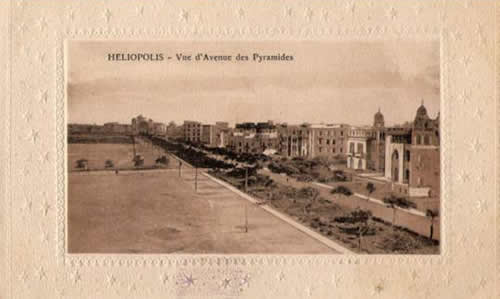 Avenue of Pyramids Heliopolis
Avenue of Pyramids Heliopolis
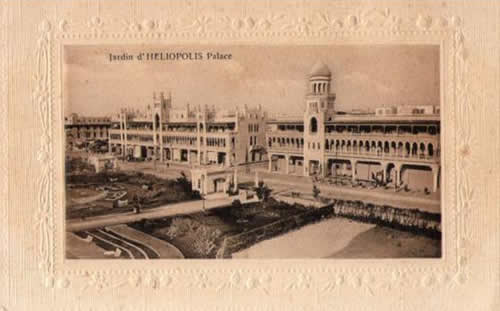 Garden of Heliopolis Palace
Garden of Heliopolis Palace
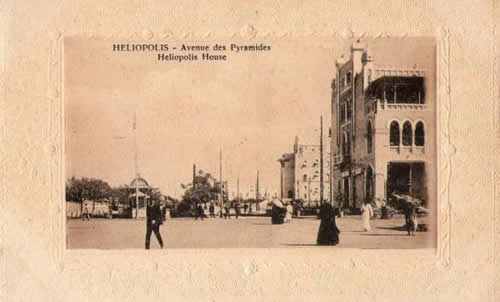
Climbed down again and strolled back to the tramway terminus. There was a big building by the terminus, which was being used for a hospital, and a lot of wounded soldiers were sitting about in pyjamas. I called out, asking if any of the 3rd. were there. One chap said he was of the 4th. Asked him if he knew a Lieut. Smythe in the 3rd., and he and another chap said they did, and that he was all right at the beginning of the Big Engagement, but they didn't know how he had got on since. We came back to Cairo and had tea at the Soldier's Meeting, after which we went round a few shops while George bought a few presents to send home to his wife and children. Went to the Soldiers' Club to see if they had any later lists of casualties, but they had not. Bought 2 tins of cigarettes and a tin of tobacco to take over with me.
Returned to Heliopolis, and arrived at the camp at about 11p.m. Got to work packing up the few things I hadn't packed this morning. Put everything I could do without in the black kit bag, to be stored at the Base in Cairo. It was after midnight when I turned in.
Sun. 22. Up at 3.45a.m. and prepared for departure. Had a rough-and-ready sort of breakfast and then we fell in. Were kept waiting about a good deal, but at last moved off at 6.45 a.m. and marched to the siding where we detrained ten days ago. Left Tyson and Wilson behind, as they had transferred to the Signalling school. While waiting at the siding I bought a bottle of ginger beer, as I thought, from a native boy. On starting to drink it, however, I thought it must be hop beer, but, after drinking nearly half of it, it seemed to have a queer taste, and, on looking at the label, I found it to be pale ale. Felt quite disgusted to think that I had been drinking beer. It left a nasty taste in my mouth, and I felt a bit sick for some time afterwards.
After the usual delay we got aboard the train and moved off. Being very tired I lay down on the floor with my tunic as a pillow, and was soon asleep. Slept nearly all the way to Alexandria, where we arrived early in the afternoon. A lot of natives swarmed round the train selling grapes, lemons, melons, soft drinks, etc., while the native police, as usual, endeavoured to beat them off with their canes. A couple of times I was just about to buy some grapes, when a policeman appeared, and the vendor quickly made himself scarce. It was amusing to see them dodging in amongst the trucks to evade the police. Sometimes a boy would be caught, and then he would tearfully plead that it was only one "verra good, verra nice lemonade". Sometimes he would get a thrashing with the policeman's cane, and would cry pitifully, but as soon as released he would be back again trying to sell his wares while the police were busy elsewhere. There were little boys and girls there eight or ten years old, just as keen as the grown-ups. It was on a wharf that the train had stopped, and right opposite there was a troopship on which we embarked shortly afterwards. She was the "Lutzow", a vessel captured from the Germans. She was smaller and much dirtier than the Orsova. During the afternoon a rope ladder was let down over the side away from the wharf, and we went in swimming.
Tea on board was a scanty meal, but as some of us had some "bully" left over from this morning's issue of rations, we didn't starve altogether.
Just before dusk we moved away from the wharf, and started forth on our journey. Went for'ard and climbed up in the rigging in order to get a good view of Alexandria with its square white buildings as we passed down the port. It was nice and cool away up there in the breeze. Many sailing skiffs were flitting about the bay, most of them returning from their day's outing. There were a number of other troop ships moored to wharves in the bay. The port was enclosed and criss-crossed by quite a lot of stone breakwaters. Moving majestically up the bay, we got out into the ocean, and soon left Alexandria behind.
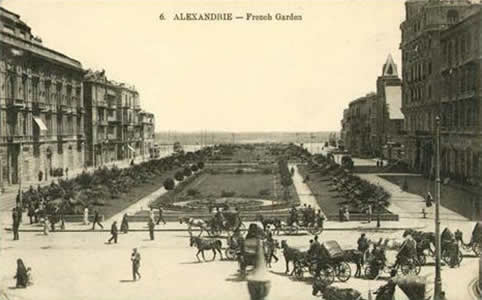
Went below and finished my letter to Mum, and got busy on Viv's, when the lights were suddenly switched out just before 8 p.m. Got my blanket and turned in on the upper deck.
Mon. 23. A lot of us were told off for "submarine guard" this morning. Different companies were on guard in different parts of the ship. Three men of our guard kept watch for an hour at a time, while the rest of us had to hang around with our rifles and bandoliers of cartridges, in case a submarine should put in an appearance. As there were so many reliefs, we only had one hour each on guard the whole day. Put in most of the time studying French. We passed a number of islands during the day, most of them dry, rocky, and barren. At first nobody seemed to know whether we were going to Gallipoli or Lemnos Island, but eventually it appeared that we were making for Lemnos. We were relieved from the guard by the other half of our company at about 6 p.m. Lights were switched off at dusk, as before.
Tues. 24. On guard again at 6a.m. this morning. Didn't have to take a turn at duty at all today. Quarrels seemed to be all the rage today, and about a score of fights with bare fists took place.
Passed more islands today, some of which had towns and villages on them. A small French cruiser or gunboat was spinning about, and once came quite close to us. Large vessels, probably troopships, could be seen in the distance. Relieved from guard at 6p.m. Turned in on the upper deck.
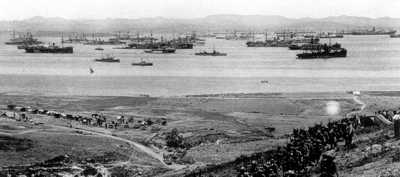 WW1 Troopships Mudros Harbour, Lemnos Island
WW1 Troopships Mudros Harbour, Lemnos Island
Wed. 25. Got up about 5.30 a.m. Ahead of us there was a fair-sized island, which eventually turned out to be Lemnos. Shortly after breakfast we swung round and headed up a broad harbour. The entrance was well mined, leaving only a small channel in the middle for the ships to pass through. A few large troopships were anchored outside the mined area. On the sides of the hills all round the harbour were numberless camps, like little white villages of canvas. At the far end of the harbour could be seen villages and farms, with cultivated lands. We moved on through channels and around islets and peninsulas till we came out into a nice bay which was full of vessels of all sizes and descriptions, hundreds and hundreds of them. There were large grey ominous-looking battle-ships, cruisers, destroyers, gunboats, and trawlers; large troopships, cargo vessels, hospital ships, motor launches, and sailing skiffs. Shortly after we anchored a submarine appeared in the distance, coming into the bay. She came fairly close to us, so that we got a good view of her. It was the first submarine I have seen. Saw another one later on beside a battleship. Lemnos is apparently a naval as well as a military base.
The submarine guard was dismissed at about 10 a.m.
Went in for a swim in the afternoon. It was all right. Some of the companies were issued with ammunition today, so it looks as if we're going to the front soon. We were expecting all day to disembark, but did not do so. Lights were switched out about 8.45 p.m. Went up on deck and tried to read the messages that some of the warships were sending to others. Picked out lots of letters here and there, but couldn't read it continuously. Read the word "nations" in one message.
Thurs. 26. Moved over to one side of the bay this morning. Went in for a swim. Studied French a bit. Got Frenchie to help me with the pronunciation. Drew up alongside of the San Patricio, an oil ship being used for supplying water. After dinner, studied French a bit. Had a look over the San Patricio with Connelly from Narrandera. She was built almost entirely of steel plates and girders, the only woodwork I could see being one or two long narrow covered troughs. Nearly her whole length was formed into wells for holding oil, some of them being over 45 feet deep. At present they contained water, which was supplied to the various vessels as required. We went down through the engine room which looked nice and clean. It was situated in the stern of the vessel, and was much smaller than those of other vessels of the same size. Looked all over the machinery, which was very interesting. Oil was used for fuel instead of coal.
Went in swimming off the stern of the San Patricio.
A rumour has come through that the Turks are suing for peace, hostilities being suspended. Another is that the Russians have retaken Warsaw. Someone said this afternoon that Howie told them we are leaving in the morning for Gallipoli. Another rumour says we are to land at the place called Anzac, from the initials of Australian and New Zealand Army Corps.
After tea, cut my name etc. on my table knife, and with a needle printed the same on the spoon, fork, and mess tin.
A thunderstorm came up, and a lot of the chaps slept below. Managed to find room on the upper deck, but got an attack of diarrhoea and couldn't get any sleep till after midnight.
Fri. 27. At breakfast-time a serjeant came down and told us to get our kits packed ready to leave at a moment's notice. He said we were going to Gallipoli, and would land at Anzac. Packed up and got everything ready. At 9.30 a.m. we fell in, and were issued with dry rations and one hundred and eighty rounds of ammunition each. The kit seemed terribly heavy with cartridges and all.
After dinner a smaller troopship came up, and we fell in and got off the old Lutzow on to the other vessel, where we are now, waiting to depart from Lemnos. Well, we are going to the front at last. I wonder if I will live to tell the tale of the war? The boat is now beginning to move off. Tonight we shall be on the battlefield.
Sat. 28. It didn't take long yesterday to travel from Lemnos Island to Gallipoli. A cold north wind was blowing. Had another attack of diarrhoea, so couldn't enjoy the trip. About 8.30 p.m. or 9, we sighted the peninsula away to the right, and shortly afterwards we could hear the crackling of musketry, and the occasional roar of artillery in the distance. Sometimes we could see the flash of the shells bursting. Away to the right a cruiser was playing a searchlight on the hills. There were several hospital ships off the coast a bit, brightly lighted up, like a Sydney ferry boat. We passed close to a small cruiser looking sombre and sinister, lying there black and still, not a light to be seen on her. There were other ships about too, mostly in total darkness.
Our ship slowed down and came to a stop fairly close to the land opposite to where the Australians first landed. We remained there till well after midnight. Once or twice a spent bullet came over from the land and struck the ship.
Large pinnaces came alongside, and, after the usual delay, we got aboard of them, and were towed to a small pier which had been erected from the beach. It was well after midnight when we landed. We were left waiting on the beach, so I rolled up in my blanket in the shelter of some cases, and started to doze off. A good deal of firing was going on away over to the left, and while lying there with my head to the ground it sounded for all the world like a saucepan-full of porridge boiling very quickly. Scarcely had time to doze off, when we had to get up and move further along the beach, where we were told we could sit down for a few minutes. Making a shrewd guess as to the probable duration of the "few minutes", I lay down with pack for pillow, sharing my blanket with Pat Robinson, and slept undisturbed till daybreak, when we had to leave the beach, which is often shelled by the Turks just after daybreak. The hill rising up from the beach is very steep, and a fair height, and I can't imagine how our chaps could ever have charged up it and rooted the Turks out. On the side of the hill is situated the village of Anzac, which consists of a number of dug-outs, and some small huts which are partly dug-out and partly built up of sandbags. A large quantity of stores in cases (mostly bully beef and biscuits) were piled up all along the beach. A number of pinnaces lie stranded at the water's edge, and a couple are sunk some distance out. A good bit further out still, a small cruiser or gunboat is sunk, her masts and funnel showing above the water.
We fell in shortly before 5a.m. and marched off to the right, up some rough steps cut in the hillside, and then into a sap which led up over the hill away from the beach. As we left, one of our boats was firing shells over the hills at the Turks. A few bullets were cracking overhead, and a shell burst somewhere, and then for the first time I felt a bit nervous, but it was only for a very short time. Coming over the top of the hill, a fine view opened out before us. The country was very rough and hilly, and rather pretty, and on the seaward side of many of the hills were collections of dug-outs similar to Anzac. The hills were covered with short scrub of different kinds.
Passing over the hill down in the next valley, we came across a little cemetery filled with soldiers' graves adorned with rough crosses made out of the sides of bully beef cases. It was a pathetic little spot. Moving on, we came to Shrapnel Gully, where we were to bivouac for a few days' training before going into the firing line. The side of a hill facing towards the sea was honeycombed with dug-outs, and amongst them we dispersed ourselves. I picked out a nice little one which was just big enough to hold me. Got to work on it with my entrenching tool trying to improve it.
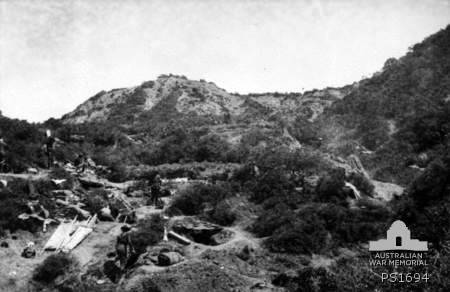 Shrapnel Gully
Shrapnel Gully
Some of our guns were sending occasional shells over to the Turks. There was one about a thousand yds. away, and every time she fired a shot the sound, even at that distance, would seem to strike with a heavy bang on one's ears, and leave them singing for some time. Before long I had a rotten headache from the noise. Then another one started, only about half as far away, and the noise from it was awful. What with the headache and diarrhoea I felt anything but well, and slept in my dug-out most of the time.
Hearing that the 7th. Reinforcements had arrived, some of the 3rd Battalion chaps came down to see us. Made enquiries about Bert and Vern, but could not find out anything.
At 4p.m. we fell in to be inspected by the Brigadier-General, who gave us a short speech, and then Howie took us away and gave us a bit of practice at bomb throwing. I was told off to act as assistant section commander to Howie's section.
Late in the afternoon the Turks sent a few shells over, but they were not falling in Shrapnel Gully. Just as we were having tea, however, a couple of explosive shells fell in the valley near where our section were practising bomb-throwing, and one fell on the hillside to the north of the Gully, rather near to a couple of our chaps, who got for their lives. One also fell in the latrine, but didn't explode.
Had some sort of a meal for tea, after which we went down to the beach to have a swim. It was a very quiet beach with dirty water and rocky bottom. Took the opportunity to wash my mess tin, which I couldn't wash during the day, as water could only be had for drinking purposes. Distributed some of the cigarettes I had b't. at Cairo amongst the boys, who were very short of them, & who appreciated them greatly. A couple of aeroplanes flew overhead pretty high up. A few shells exploded near one over the Turks' lines.
Was not scared by the shrapnel shells, but decided it would be more comfortable with a mate than sleeping alone, so got Eric Conolly to toss in with me in a dug-out big enough for two. Was so tired that I slept pretty comfortably, although the ground was hard and my bed was only a blanket & overcoat.
Sun. 29. Parade 6a.m. till 7a.m. Gave my section musketry practice for a while, and then Howie took them for bayonet practice, while I gave No.1 section musketry. Breakfast at 7a.m. At 8a.m. we fell in, and No. 2 section went round to White Valley, where we practised throwing bombs from a trench into a space about twenty or thirty yds. away. The Turks started sending a few shrapnel shells over, and every time one would come we would duck like mad down into the trench, and then laugh like fun to see the other chaps making themselves scarce. The soldiers living on the hillside didn't duck, they were used to shells, and seemed to pretty well ignore them altogether. One shell exploded right above us and the bullets from it pattered on the ground all around. One fell on either side of Creech, who hadn't time to get into the trench.
A soldier from the hillside came strolling down with a bleeding hand and a grin on his face. He seemed pleased at the prospect of getting away from Gallipoli. He had been struck by a shrapnel bullet.
Came back after 10, and Eric and I cut a bit out of the back of our dug-out. Dinner at 12 o'clock.
Sometime in the afternoon I was in our dug-out writing up my diary when someone called out for me, saying I was wanted. Came out of the dug-out and was very agreeably surprised to meet Bert. He was somewhat unshaved and more or less unkempt, as indeed were all the old soldiers, but was looking well all the same. He said Vernie was still all right, and was now O.C. of A company. After Bert had left the hospital at Birmingham, he spent a short furlough in London, which for vice he reckoned was as bad as Cairo, though not so openly. Then he was at Alexandria for a time, and left there for Gallipoli about two weeks ago, which was just after we came to Heliopolis. Neither he nor Vern were in the Big Engagement, (Later: Vern was in it; and was mentioned in despatches for bravery) he hadn't then arrived at Gallipoli; and Vern was at that time still attached to Headquarters.
Bert left before the 5p.m. parade, saying he would bring Vern along after tea. During the evening's training in bayonet work and musketry, a few shrapnel shells came over our way. After the parade I found Bert and Vern waiting in our dug-out. Vern was rather pale, but otherwise he looked well. He had been recommended for another star, and if the battalion is withdrawn and reorganised he will probably get a captaincy. Had tea, and then we all went down to the beach for a swim, after which Eric and I went with Bert and Vern up to Vern's dug-out in the rest trenches. It was a long tiresome climb up the steep dusty track to the rest trenches. A good many bullets cracked overhead as we passed along through the trenches. Vern's dug-out was a nice little room cut out of the clay, having an iron roof covered with sandbags. A table at the end and a bench for a bed on either side were formed of the solid clay, the earth being cut away from them. Another 2nd. Lieutenant named Barber shared the room with Vern, during their 48 hours in the rest trenches.
Stayed there for some time, and then Eric and I went back to Shrapnel Gully and turned in. During the day I got rid of most of the cigarettes, which were greatly appreciated.
(Spoke to V abt. Doris McPhee. He hadn't given her any encouragement and hadn't written to her. Told me the circumstances of the case. Also asked him about sending more money to Mum, now that Viv was married and couldn't spare so much. He didn't know that she was in need of any more.)
Mon. 30. After breakfast we went to White Valley to practise bomb-throwing. The dummy bombs, (jam and milk tins filled with stones etc.) were fitted with fuses which we had to light at a piece of smouldering hessian before throwing. A major came with us and explained the use of two new bombs, which are ignited by pulling a string out. They are supposed to be very effective. He also explained the ordinary jam-tin bomb, and the block of gun-cotton, which is exceptionally powerful. Showed us a hand grenade too. Nos. 2 and 8 sections were told off to join the battalion tonight, and to get ready to go up to the rest trenches at 7p.m.
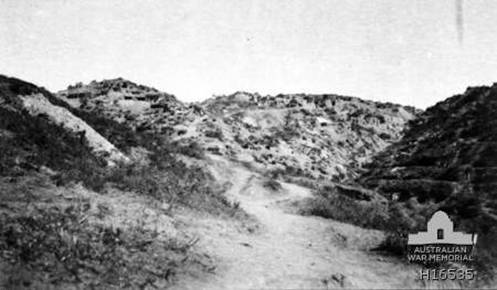 Gallipoli, Turkey. 1915. A general view of White's Valley taken from a sap on the beach near Brighton Depot
Gallipoli, Turkey. 1915. A general view of White's Valley taken from a sap on the beach near Brighton Depot
After parade Bert came down, & I went with him to his dug-out, which was a small hollow scratched out of the side of the trench, as also were nearly all of the men's dug-outs. Had dinner with him on fried soaked biscuits and jam. The biscuits were quite palatable that way. After dinner we went up to Vern's dug-out. While there a high explosive landed a few yds. short of the dug-out, sending a heap of dirt down in front of the doorway and nearly smothered us with dust. A few minutes later another one came over, this time going a few yards too far, and gave us another dust-bath.
Got some paper from Vern and wrote to Mum and Dad, also to Beattie Bostock. When leaving, Vern came down to the Q.M's. store and bought a big box of cigarettes, half of which he told me to give to his Narrandera friends, Frost, Gardiner, and Roach. The other half I was to give out to my own friends.
Just as I was about to leave the hill, the Turks started sending shells over into the valley through which I had to pass to get to Shrapnel Gully, and I was a bit scared about going down. However, they knocked off just as I left the hill. One of the shells, a high explosive, had fallen right on the edge of the track, and threw a heap of dirt across the path.
Short parade this afternoon, so we could have tea at 6 p.m. in order to be able to go up to the battalion at 7 p.m. Abt. tea-time, however, word came that we were not to go tonight, as we were wanted for some trench-digging, but would go on Wednesday evening for certain.
A.T., Lieut. Marshall and I went up to Vern's dug-out. V. said he was allotting another 6/- a day to Mum. Wrote a letter to Elsie and Vera Billingham. It was just after 11 p.m. when I got back to Shrapnel Gully and just then the Turks started pouring over a regular fusillade of machine gun and rifle fire, which was still going when I went off to sleep.
Tues. 31. Went to White Valley again this morning to practise bomb-throwing. "A" Co. goes into the firing line today so didn't visit Bert and Vern. Took a party to the beach and went for a swim. My section has been told off for digging fatigue for tonight. After dinner took another swimming party to the beach, but didn't go in. Short parade again this evening. Tea at 6.30p.m. One solitary shell came over and landed in our gully, leaving a big hole in the ground at the foot of the hill opposite.
At 7.30p.m. we fell in for digging fatigue, and climbed away up over the steep hills to the support trenches. I had a bad attack and felt deadly. Was pretty well knocked up by the time we got to the trenches. The support trenches had to be deepened in places, & we worked at it till 11.30p.m. In some parts of the trenches the smell from dead bodies was awful. Just as we arrived the Turks gave us a heavy fire demonstration. It was well after midnight when we got back to Shrapnel Gully.
SEPTEMBER 1915
Wednesday, 1st. Wattle Day. Bert had a piece of wattle that Mrs. Fox sent him to wear on this day. We had no early parade this morning on account of working late last night. After breakfast, bomb-throwing till 10a.m. down past the cook-house. Some shrapnel landed pretty close today, a few pellets striking the ground within a yd. or two of me. Dent was grazed on his rear by a pellet, and afterwards he kept his entrenching tool on.
A lot of dead men's property had been tipped in a heap just round in the main valley, and I went and collected a few old respirators to get the netting off them for fly-veils, etc.
After Dinner I was sent to the beach with 8 men for fatigue work. While there I met Tom Martin from Gladesville. He told me Wall Park was killed on the 6th. of August by a bomb hitting him on the head as he was putting his head up above the parapet. I was very sorry to hear of his death.
At 5p.m. we fell in and were then dismissed to get everything ready for our departure. Tea at 6p.m. We got bread for the first time since leaving Lemnos. Were issued with bully and biscuits for tomorrow's rations.
Fell in at 6.45p.m. with full kit, & proceeded to the 3rd. battalion's parade ground. There were 33 of us came up. Ten were taken up to the support trenches for fatigue work. Some slept in the rest trenches, and some of us stayed at the parade ground. It was an awful strain marching up the valley and over the hill in full equipment. Eric and I dossed together. Heavy cannonading from our ships over on the left. Hadn't been in bed long when I felt a couple of flies crawling about me. Tried to catch the aggravating beggars, but couldn't manage it. More of them came, and I had a rather restless night of it.
Thurs. 2. The 3rd. came out of the firing line about 9a.m. Eric and I hunted Bert up and we met Vern, who gave us some sweet biscuits and chocolates. We went to Bert's dug-out and stayed there talking, till someone came looking for Eric and I saying we were wanted at the parade ground. They were allotting the men to different platoons. Eric and I were put in No.2 platoon of A Co. He and I got a nice big dug-out with Tom Board & Barry. It was dug square, and had an iron roof with a little dirt thrown on it.
After dinner we amused ourselves shooting flies with cordite in an empty cartridge-case with a hole in it at the thick end for a fuse, which consisted of a piece of cordite. Caught about 40 or 50 flies in one shot once, by exploding a line of jam on a piece of paper. The enemy were very quiet during the early afternoon, scarcely a shot being fired. Heard some rumours about Germany suing for peace.
After tea, went round looking for Vern's dug-out to find out any news that might be available, but (couldn't) find it. Wandered round into the firing line trenches. Turned back and came round through the trenches, and again arrived in the firing line, this time at a machine gun position. Went up and looked over the parapet through a periscope at the Turks' trenches. A bullet cracked near by, and one of the men told me to come down as they were firing at the periscope. An aeroplane flew overhead a good distance up and some of the men fired a few shots at it.
Chatted with the men at the machine-gun position till it was dark, when they put a new gun through a short trial. It had an arrangement for suppressing the flash as each shot was fired.
Went back to rest trenches, and we were warned to be ready for an attack by the Turks at any time between now and the 5th. inst. We had to sleep in full uniform with equipment and rifle ready for instant action. Met Bert and he told me that Vern had been recommended for a D.S.O. During the Big Engagement he had run out under fire and repaired a couple of telephone lines.
Cleaned our rifles and got everything ready for the attack, which was expected at 11p.m tonight. Shortly after 9 the Turks began a heavy fusillade of rifle and machine-gun fire. Turned in at 9.30p.m. Awoke at 11.15p.m., and the firing was still going strong.
Fri. 3. The expected attack didn't come off so far. Very quiet morning. For several hours in the middle of the day there was nothing doing, no shots fired from either side. Everything seemed calm and peaceful, as though there were no war on. Heard some rumours that we are to be shifted around to the left, opposite Hill 971.
Heavy cannonading. One of our guns supposed to be hit.
A.T., a large biplane flew overhead. I think it is one of our own. It was at a comparatively low altitude.
The sea looked very calm and peaceful this evening, like a sheet of glass. Various vessels lay idly in the gulf, the smoke from them hanging about like spectres in the still air. Over to the left a little gun boat nosed up close to the shore, and blazed away a few shots.
Later on in the evening some of our chaps over to the left sent up a few flares. They were very pretty and made a very strong bright light. Turned in about 9p.m. and was worried all night long with flies.
Sat. 4. After breakfast we fell in and marched off to the support trenches, leaving our packs at the parade ground. We passed a dead Turk in a stretcher. It appears they attempted an attack last night, but were noticed in time and driven back into their trench by rifle and machine gun fire. Two, however, got over to our trench and one of them was killed and the other captured. Went for a stroll round the trenches. In one place a lot of half decayed bodies could be seen through a periscope. They were only a few yds. away. Went into the firing and looked through the periscope at the Turks' trenches, which were only 3 or 4 yds. away. A couple of saps were being tunnelled in under their trenches in order to blow them up. Went on a bit further and fired six rounds through a periscope rifle at a sandbag on a Turks' trench about 60 yds. away, and broke the top of it away.
Went back and down in to a trench where there was a machine-gun position, from which a rather pretty view of sea and land could be obtained. Was afterwards told off to carry dirt from the tunnel to where they were throwing it out over the parapet. Had scarcely started when it was dinner time. There was a dead body under the parapet just above where I had to sit for dinner, and a lot of maggots kept dropping down into the trench. I was afraid of them falling into my tea or stew. The effluvia was not too pleasant, and the flies swarmed round the food in thousands, and persisted in sticking themselves in the jam.
After dinner, started on the dirt carrying again. A lot of the 7th. of the 3rd. chaps were sent up from the Gully, and were put on to pulling down the sandbags from in front of several resting positions in order to make observation posts of them. While doing so, they rooted up several rotten bodies. They may have been Turks, and they may not.
Went down into the tunnel to have a sleep. The place reeked with the smell of decaying bodies, but it didn't stop me from having a few hours good sleep.
We had rice and raisins for tea. It looked rather dirty and unwholesome, and tasted little better. Some maggots were crawling up a tea dixie just in front of me, and it nearly made me sick.
At 7p.m. our platoon had to go on duty, and I went on with sjt. McGregor. We had to guard the tunnel, doing 1/2hr. on and 1 hr. off, in pairs, and had to patrol it every 10 minutes, walking right down to the new machine-gun position, and prodding round with a bayonet to make sure nobody was there. Parker and I were on together. It was pitch dark in the tunnel, which twisted and turned all ways, and we had to feel our way along.
Sun. 5. Had stand to from 4a.m. till 5a.m. when we were off duty. Was told off for Q.M.S. fatigue with Blackwood, Barry, and two others. Had the job of carrying water from Shrapnel Gully up through Dead Man's Gully to our company's cookhouse. Had our meals at the cookhouse, being right away from the smell and the maggots. We had a very hard day's work, having to make 10 trips each for water. Usually they only make 6, but now there are extra men to cook for. This is the sordid dreary part of war that wears the men out. A couple of Englishmen came up the valley, and they looked pitifully
gaunt and haggard, dragging one leg painfully along after the other. Their skin was parched and blackened by exposure, and death seemed to be written on their thin drawn faces.
We were back in the trenches in good time to go on duty again at 7p.m. Was with Cpl. Livingstone this time, on a lookout position. Just after we got there, while Irish and Sharpe were on, a heavy explosion occurred near by, and a heap of dirt came tumbling down into our position. I thought we had stopped a "75", but it turned out to be a "football", an extra large bomb fired from a trench mortar. Nobody was hurt by it. Later on a wounded man was brought along the trench, gasping. Heard afterwards that it was poor old Arthur Ide. Duggan was also seriously injured. It appears that a bomb was thrown over and exploded, hitting Ide and Duggan and another chap. Ide caught it in the head and knee, while Duggan got a piece through the chest. They are the first two casualties in the 7th. of the 3rd., except of course, Daly, who died on the "Orsova".
As this is the last night we are given to evacuate "Lone Pine", the attack, if it comes at all, will come tonight, so we have been warned to be very much on the alert.
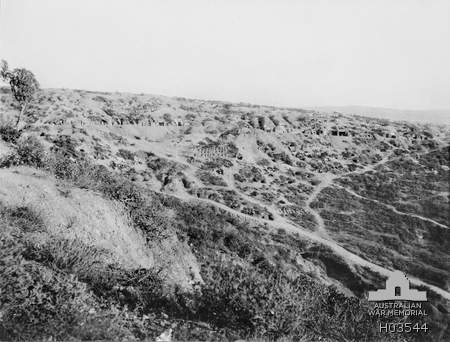 Lone Pine Area, Gallipoli. 2 Sep 1915.
Lone Pine Area, Gallipoli. 2 Sep 1915.
Looking south from gun positions on the heights of Gallipoli between Brown's Dip and Macay's Hill
Barry and I were on together, on second relief. A heavy musketry fusillade was kept up, and bombs were used freely. I rather like the noise of the crackling of musketry, and the thunder-like rumble of bombs. The bullets kept whizzing by overhead, but our position was low enough down to be quite safe from them. We had little to worry about, as we were out of range of the Turks' fuse bombs, and if they sent over any of their mortar percussion bombs, well, it was no use worrying about them, as there would be no time to dodge them, and we'd have to take our chances. Our chaps were doing most of the bomb-throwing, as they were expecting an attack. When a bomb exploded, there was first the dull roar of the explosion, then a queer buzzing noise as the pieces flew out through the air, like the buzzing of a swarm of flies when disturbed.
One of our ships kept a searchlight going on the enemy's trenches. A number of flares were sent up at intervals. They were very pretty, and lighted the place up almost like day.
Our position was a long way from the Turks' trenches in front, but just opposite, at our rear, the Turks' trenches were only 4 or 5 yds. from ours. That was where most of the bomb-throwing was going on.
Mon. 6. Was very sleepy towards morning. We all were, in fact. It was a hard task to keep awake. While on the lookout post from 2 till 3 a.m. I would be straining to keep awake, watching the front, but every now and then my mind would start wandering. When a bomb would explode I'd hear the buzzing, and in the half-dazed state of mind I was in, would at first really think it was a swarm of flies disturbed from a jam tin or piece of meat. It was a relief when the hour's duty was up. Had to stand to from 4 till 5a.m., when we were off. While standing to, a small piece of burning paper flew over the position, and we thought it was the fuse of a bomb. Two or three of the chaps sprang forward, and the result was that the corporal got Barry's bayonet in his eye. Took him away to the doctor. Fortunately the eye itself was not damaged.
After "Carry-on", I went to the trench and slept till breakfast, after which a lot of us were put on carrying dirt from the saps in the firing line trench to Brown's Dip. Vern told me that he had got his second star all right. My word, he is doing well. A lieutenant, and only twenty.
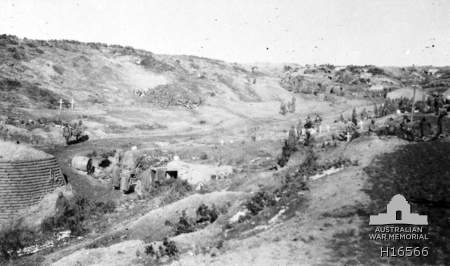 Gallipoli Peninsula, Turkey. 1915. AIF troops in Brown's Dip which leads in the direction of Lone Pine.
Gallipoli Peninsula, Turkey. 1915. AIF troops in Brown's Dip which leads in the direction of Lone Pine.
Note the crosses at graves on both sides of the dip.
Some of our chaps working in one of the look out positions dug up some rotten bodies. Cut a couple of buttons off one of the Turk's overcoats to keep as souvenirs. The dirt-carrying was a rotten job, as we were all completely dead-beat after our 48 hours in the firing line. We were relieved at midday, and dragged ourselves back to the rest trenches. Had a good sleep after dinner. Vern came along and told me that we are not going with the battalion when they are withdrawn for a spell.
Were shifted out of our old position in the rest trenches to make room for some other unit. Some mail came along this afternoon, and I got three letters, one from Vera Billingham, one from May Curtain, and one from F. T. Saunders thanking me for the gift to Foreign Missions. His letter was very helpful and refreshing. May's letter was in reply to one I wrote to her for her birthday, just before leaving Liverpool. She wants me to send her and Miss Burke a photo. Vera said Eric Wade was leaving Sydney a few days after we left, by the "Runic".
Had tea up in the rest trenches. Slept in the parade ground.
Tues. 7. It got very cold early in the morning. Got up and put on my boots sox and puttees and turned in again.
We were issued with bread this morning, also cigarettes and matches. Lots were cast for a few tins of tobacco, and one of them fell to me. Gave it to George Schroder. After tea, on fatigue work carrying dead men's property down to Dead Man's Gully. Scored a waterproof sheet and a cap sun shade. Also got a Turk's button with star and crescent on it.
Saw Bert afterwards, he was not too well. Told us the battalion was not going yet after all, as they have to go into the trenches again tomorrow to instruct the newcomers, the 6th. Brigade. Slept in parade ground.
Wed. 8. Bert still unwell. The old hands of the 3rd. have to go up into the firing line again at midday today, it is not known for how long. Got some writing paper and envelopes of Vern and went round to the parade ground to write some letters. Just started one to Mum when a "football" flew overhead and landed about 40 yds. away, throwing up a heap of dirt. Most of the chaps left the parade ground and went up in the rest trenches, where it is much safer. Didn't bother going, as I had a good place to sit and write, but had hardly resumed the letter when we heard another coming, and this time it landed only about 20 yds. away, and threw up a great heap of dirt and clods, some of which fell about my feet. One big clod hit Ingram over the kidney and knocked him out for a while. He had to be taken to the hospital. Decided that discretion was the better part of valour, and went up to Bert's dug-out to continue writing. Wrote to Mum and Dad.
After dinner, went down to the beach for a swim with Howie and some others. There seem to be a lot of soldiers arriving lately. There were a crowd of them in the vicinity of Shrapnel Gully. It seems possible that some big move is pending. Washed a couple of handkerchiefs and a pair of sox while at the beach. Adopted the usual and handy method of tying the articles to a string attached to one of the old barges stranded along the beach, and allowing them to swish about in the water. It makes them nice and clean, and requires no elbow grease.
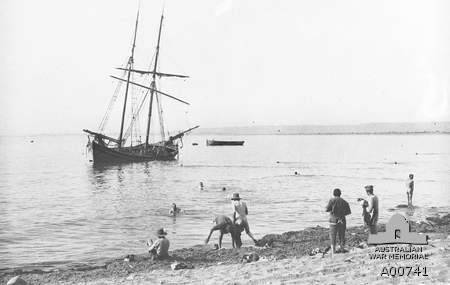 Soldiers swimming and relaxing on the beach near a captured Turkish barque.
Soldiers swimming and relaxing on the beach near a captured Turkish barque.
Wrote to May Curtain at Corowa. Said I was getting Mum to send her and Miss Burke one of my photos.
After tea, about 20 of us were taken for a fatigue party to carry bombs to Brigade Hqrs. We had a long way to carry them, through long winding trenches, which reminded me of the proverb, "It's a long lane that has no turning". We had 4 boxes full each to take, which meant 4 trips, but on the third trip, we took 2 boxes each. They were beastly heavy, and it was a relief when it was all over.
Thurs. 9. Got job of mess orderly today. George Schroder and I had to take breakfast all the way to Lone Pine trenches. Saw Bert there and he told me they had to stay there till Sunday. He was doing a 24-hour shift in charge of a post.
George was put on Q.M.S. fatigue, & Blackwood made mess orderly in his place. There is a persistent rumour getting about that the Russians have surrounded the German army.
Wrote a letter to Jack Elliott.
After dinner, the mess orderlies who took dinner to Lone Pine told us that the Turks were sapping towards one of our saps in the firing line, and were expected to break through any minute. One of our men was stationed at the mouth of our sap with bayonet fixed, and rifle loaded and cocked, and aimed continuously at the end of the sap. Pity help the poor sapper when his pick breaks through the partition! He is gradually digging his way to death.
Went to Lone Pine with tea. While there one of our howitzers started landing shells in the Turkish trenches. While going back I saw a shell in flight for the first time. Once sighted, it was easy to keep it in view till it landed.
After dusk Eric and I went for a walk down Dead Man's Gully to the beach. It was a long tiresome climb up the gully again. Just as we were going to bed, a burst of rifle fire broke out suddenly. It was only a demonstration, however, and didn't last long. Heard that the Russians have surrounded Warsaw, with 200,000 Germans inside.
Fri. 10. Things were very quiet today. One of our aeroplanes went overhead and several shells burst close to her but didn't damage her. It was said this evening that the Turks blew up the end of their tunnel. Cold evening. Went to bed early.
Sat. 11. Mess orderly again today. Eric was put on Q.M.S. fatigue again after having been on it the day before yesterday. There seems to be a lot of mismanagement somewhere. After breakfast, Ryan and I took dry rations to Lone Pine. Saw Bert there and asked him concerning last night's report about the Turks blowing up their sap. He said (it) wasn't true; but at 7am. today our chaps put 40lb. of guncotton in one of our saps and blew up the Turks' tunnel. They were working in it at the time, and the scurrying of feet could be heard after the explosion. Some of them must have been killed. Came back to the parade ground and started studying "Psychology". The Turks began sending over shrapnel shells. Most of them were bursting high and over to the left, over Shrapnel Gully way. A man in Dead Man's Gully was struck. He was carried away in a stretcher. Didn't bother leaving the parade ground, but, being tired, lay down and went off to sleep. Heard that Drain and "Dubbo" Sharpe were both wounded by shrapnel in Dead Man's Gully. Got the full strength of it from Eric Conolly afterwards. They were all on Q.M.S. fatigue, carrying water, when the shrapnel shells began to
come over. Drain, Creech, and Eric got into a small dug-out at the side of the track and stayed there a while. After a bit Drain decided to carry on, but the others thought it advisable to wait a little longer. Drain went out of the dug-out, but had only gone a few yds. when another shell burst in the air, and he got a piece of the broken shell over the kidney. Dubbo was a few yds. further on, and got a pellet in the thigh. Du Prat was there too, and a pellet dinted one of his water cans.
Had to take dinner to Lone Pine. Bert was very sick; couldn't eat anything. Came back to the cookhouse and got some rice and milk and sugar and cooked it up nicely and took it to Lone Pine for Bert. He appreciated it all right.
A.T. went for a walk up to Lone Pine. Met a couple of casualties on the way. They were 24th. battalion men. A "75" had got four of them. The first one I met was wounded in several places, and the next was dead. He lay still and silent on the stretcher, and it made me feel quite "skeery" for a while.
Bert was on duty at the Dead-end. After having been on duty all the previous night, he was told this morning that he would be off all day, but was to keep about in case he might be required. Soon afterwards someone came along and put him in charge of the post at the Dead-end.
Stayed at the Dead-end for an hour or so.
Sun. 12. The battalion was relieved this morning, and returned to the rest trenches. Bert was still unwell, and hadn't had any breakfast, so I went to the cookhouse and boiled some water and made up some Bovril for him. In the meantime he had been to the doctor, who advised him to eat nothing for 12 hours, so he put the Bovril in his water bottle to keep for later on.
We were told to get our things ready to go to Shrapnel Valley, where we will be staying for a month or six weeks, while the battalion are away having a spell. Howie advised me to put up my three stripes again, as they would want section and platoon commanders in the training camp. Took his advice and marked three stripes on the peak of my cap with a pencil.
After dinner we fell in with full kit and moved off down to Shrapnel Valley. Eric and I got a nice little dug-out, which, with a little improving, will be O.K. As it looked like rain we fixed up a couple of waterproof sheets to keep the rain out.
The battalion came down and halted on the side of a hill just down a bit from Shrapnel Valley. Went round and had a talk to Bert for a while. Gave him a list of things to get for me, including a bottle of luminous paint.
Went back to the dug-out, and Howie came along looking for men for a fatigue party to bring rations. Helped him get a dozen men and went up to the Q.M.S. and got the rations. The Adjutant addressed me as serjeant and I told him I was only a private, but had been a serjeant.
Had a late tea. Vern came along and stayed a while, and then we went round to Bert's dug-out. Said Goodbye to Vern. Won't see him for some time now, I suppose. They are embarking some time during the night, and will probably be at Mudross by daylight.
We stayed with Bert for an hour or so, and then said "Goodbye". Who knows - I might be killed before they get back?
Mon. 13. Light shower. Some water dripped through our roof. Got a pick and shovel and got to work deepening our dug-out. The ground was very hard, but we improved it considerably. The Turks sent a lot of shrapnel over during the morning, and every time a shell came, three of our guns replied, so that for every shell they gave us, they got three in return for it. However, they managed to put in some good work today, killing 5 and wounding 25, on and near the beach.
Had shave. Left moustache on. After dinner, we worked at the dug-out a bit, trying to take it further back into the hill. But the ground was so very hard that we had to leave it. It was almost like digging through rock. We then fixed up a sort of gable skeleton, and secured the two waterproof sheets over it, making a fairly decent roof. Eric got a box somewhere, which we use for a table, and we have now quite a comfortable little home.
Tues. 14. Breakfast consisted of a small piece of fatty bacon and some barely drinkable tea. After breakfast strolled down to the beach with Howie. He went to get a tooth out. While there the Turks began sending shrapnel over. The pellets pattered down on the wharves, and there was a general scatter for shelter. Fortunately nobody was hit. Coming back we went to where the 3rd battalion had rested prior to embarking, and collected 2 waterproof sheets, 3 tins of jam and a lot of bully beef. We handed in the beef to the Q.M.S. and stuck to the rest.
At 4p.m. we fell in and were divided into platoons. I was made corporal with No.2 platoon, under sjt. Hunt. Had some practice in loading and aiming till 5.30pm. A.T. had to take my platoon for a fatigue party over near Brown's Dip to deepen the communicating trench between Brigade and Divisional Hqrs. Worked at it till about 10.30p.m.
Wed. 15. It rained slightly this morning, but we kept quite dry in our little dug-out. As the cooks had no dry wood we didn't get breakfast, which consisted of one egg each, till about 8.30 am.
After breakfast, was sent with a fatigue party of six to Divisional Hqrs. to enlarge a dug-out for the guard. Worked at it most of the day. During the morning "Beachy Bill" sent over a number of explosive shells which landed in the sea near the sunken steamboat, sending up a tall jet of spray each time.
Finished the dug-out about 4.30p.m. While going back a Saube flew overhead, and dropped a bomb, which fell on the top of the hill opposite Shrapnel Valley.
After tea, felt tired and lonely. I miss Bert and Vern a great deal. Read some of the New Testament, and it cheered me up considerably. Went for a walk down to the beach. It was a lovely calm moonlight night, and it reminded me a lot of Lady Robinson's beach at home, only instead of being sandy, there was nothing but gravel and rocks. Walked along towards Gaba Tepe, and came to a wharf built out on to the end of a sunken pinnace. There were a lot of chaps in swimming there. Strolled back and went to bed. As usual, the "chats" worried me considerably.
Thurs. 16. Had a dream in which I met Bert and Viola, and waking up I felt somewhat home-sick.
After breakfast, started a letter to Mr. Harward. After dinner was sent with a fatigue party to Divisional Hqrs. to dig a pit for a latrine.
Shortly after we started it came on to rain, and we had to take shelter in a dug-out near by till it stopped raining. Got the pit about half finished by 5p.m. when we knocked off and went back. A.T. went for walk down to and along the beach.
Fri. 17. Vern's birthday. He is now 21. More details arrived in Shrapnel Valley during the night, and included most of our chaps whom we had left behind in Heliopolis. Continued writing letter to Mr. Harward.
Had no parade this morning. They seem to be very lax about the drill here. Fell in at 4 p.m and were reorganised into a battalion. The old company was made A company and was much the same as before. The newcomers were formed into B, C, and D companies. As before I got in No.2 platoon with sjt. Hunt. In future A and B companies will have to drill from 6.30 to 7.30a.m. and from 9 till 11a.m. The other two companies will do their three hours drill straight off in the afternoon. It will be O.K. only having three hours drill per day, and now that there are so many men here, there will be fewer fatigues.
There was a pay this afternoon, when the men fell in for tea. I only wanted to draw 5/- but had to take 10/-, as they were paying in 10/- notes. Most of the chaps took £1, which was the maximum allowed.
A.T. Lines and I strolled down to the beach to see if we could buy any eggs, but the last of them were sold as we got there. Went for a short stroll along the beach.
Sat. 18. Commenced with a regular order of things this morning. "Reveille" at 6a.m., consisting of a lot of blasts of a whistle; "Warning for Parade" at 6.15a.m. being three long whistle blasts; "Assemble" at 6.25a.m. being two blasts; and "Fall in" at 6.30a.m. being one blast.
We got the platoon on rifle shooting with the periscope rifles. Most of the shooting was very bad. After breakfast we went on with the shooting which continued to be very bad. Long was the only one to get a decent group. At the end sjt. Hunt and I had a go at it, and by mistake we both fired at the same target. The whole ten shots got in the bull.
After finishing at the range, we went round to White Valley and practised bomb throwing till 11a.m.
Organised a chat-hunting expedition, and searched all through my clothes. Did well, bagging three chats and about twenty eggs.
After dinner, went for a swim with Long and McNamara. Washed singlet and some handkerchiefs while there. We found a little humpy where milk was for sale at 1/9 a tin. It is downright robbery. These fellows are taking a mean advantage of the soldiers who are fighting for their country, and who have to either pay the exorbitant price or else go without. Bought a tin of the precious stuff.
Wrote a letter to Vern with birthday greetings. At 4p.m. we all had to fall in for an inspection by General Walker. As, however, he had addressed A Co. before, we were promptly dismissed.
When we fell in for tea the usual quiet prevailed, an occasional rifle shot breaking the stillness. All of a sudden, however, the place seemed to be in an uproar, the air vibrating with the crackling, spluttering, and hissing of musketry, the bursting of shrapnel shells, and the heavy roaring of our own artillery. Now and again shrapnel bullets pattered down around us, one striking sjt. Hunt on the knee, but doing no damage. It sounded like a violent thunderstorm on a large scale.
I felt quite happy while it lasted, as I like to hear the noise. It sounded more like a real battle than anything I've heard yet. It didn't last long however, and soon died down again. As we could hear no machine guns, I thought it was probably only a demonstration, but heard afterwards that the Turks attacked at Lone Pine, but were beaten back.
After tea, started writing a letter to Bert. When it got too dark to write I went for a walk down to the beach. Went along towards Gaba Tepe as far as our supports, which were occupied by the Light Horse.
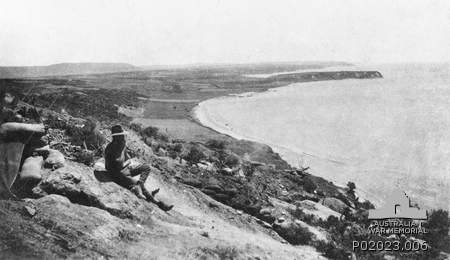 Gallipoli, Turkey. 1915. A soldier sitting on a slope at Ryries Post looking south along the coastline to Gaba Tepe.
Gallipoli, Turkey. 1915. A soldier sitting on a slope at Ryries Post looking south along the coastline to Gaba Tepe.
Sun. 19. Breakfast at 6a.m. Nos. 2 & 3 platoons were told off for a digging fatigue, and after breakfast we went down to a valley near the beach, where we had to excavate a flat space on which a hospital is to be built. Worked at it till 1a.m., when we were relieved by another party. While there our O.C. told us we would probably be going into the trenches for 48 hours this week, to relieve a company of the 3rd. Brigade. That will be O.K.
When we returned to Shrapnel Valley a Church of England service was in progress there. Stayed for the rest of the sermon, which was very interesting. First I've heard for five weeks. It was quite a pleasure to sit and listen to a decent sermon once again.
After dinner had a shave and finished Bert's letter. The Turks started sending high explosive shells over in search of one of our guns, the shells falling on the far side of the hill, towards the enemy. While we were having tea, however, one came over the top of the hill and landed right in the upper part of the valley, where a lot of men were camped. It was followed by a general roar of laughter from all over the valley as the chaps near where it exploded cleared for their lives.
After tea, Eric and I went for a walk down to the beach and up to the supports towards Gaba Tepe.
Mon. 20. Dear old Mum's birthday. I think she is 53 now. Sjt. Hunt took the hospital fatigue party this morning. Posted letters to Bert and Vern. Not feeling too well. Wrote a letter to Mum. Started one to Dad, but felt too ill to go on with it. Lay down in the dug-out most of the day. Think I'm getting influenza.
Tues. 21. Took the fatigue party round this morning, and managed to get through somehow. In the afternoon we had shooting practice, and I had to supervise. However, I felt too ill to carry on, and got the sjt.mgr. to look after them while I went and lay down in the dug-out. Eric has been advising me to parade sick tomorrow. I will think it over. It would be an advantage to get on light diet and "no duty". Might even be sent to hospital if its influenza.
Wed. 22. Feeling worse this morning. It was sjt. Hunt's turn to take the fatigue party, so I paraded sick. Now, I had a very croaky voice with a cold in the throat, and, when my turn came, a doctor (a major) probably jumped to the conclusion that that was all that was wrong with me, for he just looked at my tongue, felt my pulse, and then prescribed cough tablets and put me down for "duty"! I was thunderstruck and absolutely disgusted. Didn't fail to express some very unfavourable opinions about the doctor. In the afternoon, to my utter disgust, I was called out with the "malingerers" to go on extra fatigue duty, as was everyone who had paraded sick and not been marked "no duty". I strongly objected, and was about to go and have an argument with the adjutant, when the fatigue party officers, seeing I was really unwell, told me I needn't go with them.
Thurs. 23. Sjt. Hunt offered to take the fatigue party for me this morning, so I paraded sick again. The assistant doctor seemed to take some notice of me, and when my turn came, he suggested something to the other doctor, with the result that I was thoroughly examined, and then sent to hospital under suspicion of having pneumonia. Got my blanket, waterproof, pneumatic pillow, and mess tin, and went into the hospital. McNamara, Lynch, and some others of A Co. were there with the "flu".
In the evening they decided to send me on board the hospital ship, and I was taken down to the beach on a stretcher, although I could have walked all right. On the beach I was put in a large open room with a lot more, where we stayed for the night, sleeping in our stretchers.
Fri. 24. Breakfast consisted of soaked biscuits, and I couldn't eat more than a few mouthfuls of the stuff. About midday we were put on a lighter and taken out to the hospital ship. I was hauled up by a derrick, stretcher and all. Was given a bath, which I badly needed, and put into a nice comfortable bed. Everything is comfortable here, with a nurse in attendance. Didn't get any dinner, and had a cup of milk for tea. It was made-up milk and wasn't at all nice. Got a few grapes, but they didn't taste nice, owing to the taste in my mouth.
Sat. 25. This morning we left for Lemnos Island, arriving there in the afternoon. Am put on milk diet. Getting very weak.
Sun. 26. Transferred to a troopship going to England today. Was so weak that I couldn't walk from my bed a few yards to where the stretcher was. Had to be assisted. Was hauled up on to the troopship and carried an interminable distance and then deposited in a little room off the serjeants' mess. The bed was very uncomfortable, and there seemed to be no conveniences, and there were no nurses. (There is no record of the rest of the month)
NEXT >>



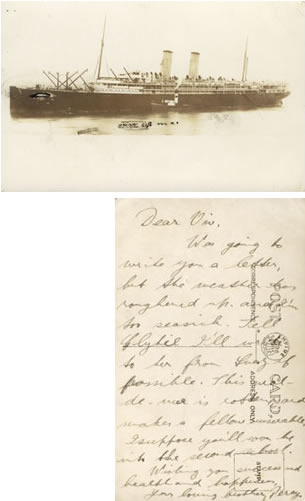




 This evening I met a chap from the 3rd. battalion. He was wounded at the beginning of the big engagement on last Saturday week. Enquired of him about Bert and Vern, and he said there was a Smythe in the battalion, and that he was all right when he left, at the commencement of the big advance, but he didn't know how he had got on since.
This evening I met a chap from the 3rd. battalion. He was wounded at the beginning of the big engagement on last Saturday week. Enquired of him about Bert and Vern, and he said there was a Smythe in the battalion, and that he was all right when he left, at the commencement of the big advance, but he didn't know how he had got on since. Had tea at the "Soldiers Meeting" Restaurant for 4 piastres. Had given the odd ½pt. to a beggar woman, so was stony broke. After tea, saw some of the real horror of the lower life in Cairo. Without doubt it is the vilest place imaginable.
Had tea at the "Soldiers Meeting" Restaurant for 4 piastres. Had given the odd ½pt. to a beggar woman, so was stony broke. After tea, saw some of the real horror of the lower life in Cairo. Without doubt it is the vilest place imaginable.
















